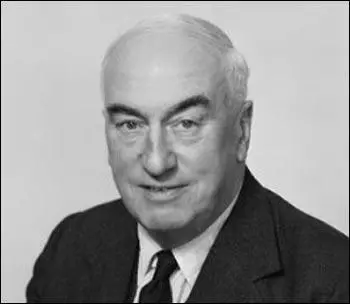On this day on 14th February
On this day in 1400 King Richard II was murdered. Richard, the second son of Edward, the Black Prince and Joan of Kent, was born on 6th January, 1367.
Richard married 16-year-old Anne of Bohemia on 20th January 1382. She was the daughter of the late Emperor Charles IV. Anne's father had been the most powerful monarch in Europe at the time, ruling over about half of Europe's population and territory. The marriage was against the wishes of many members of his nobility and members of parliament, and occurred primarily at the instigation of Richard close associate, Michael de la Pole, 1st Earl of Suffolk. "She did not produce an heir (there are no reports of stillborn children, or children who died in infancy: in all probability she never became pregnant), but no chronicler reports any other liaisons on the king's part."
At the time of his marriage he was described as being "fair-haired and self-consciously youthful, keeping his face clean-shaven when it was conventional for grown men to wear a beard". A contemporary said he was "abrupt and somewhat stammering in his speech, capricious in his manners... prodigal in his gifts, extravagantly splendid in his entertainments and dress."
According to Henry Knighton, Queen Anne requested that Richard should forgive the rebels: "In the following year, 1382, at the special request of Queen Anne and other magnates of the realm, especially the pious Duke of Lancaster, the lord King gave a general pardon to all the aforesaid rebels and malefactors, their adherents, abettors and followers. He granted charters to this effect and through God's mercy the previous madness came to an end."
Richard was very interested in fashion and pioneered the codpiece, worn over tight hose, embroidered doublets with padded shoulders and the houpelande (a long coloured robe with a high neck that replaced the more traditional cloak). "Such fashions were designed to display the male physique to perfection, emphasising long legs, a slim waist and powerful shoulders."
Richard II was not a very successful military commander. His biographer, Peter Earle, points out: "Richard, son of the Black Prince, inherited only his father's outward appearance and none of his skills at war. Not that he was the coward or weakling of legend - on many occasions in his reign he was to display outstanding courage - but his was the courage of pride, not military prowess."
This was reflected in a failed military expedition to Scotland in 1385. This encouraged the French to consider invading England. Charles VI assembled the largest force so far raised by either side during the Hundred Years War. This induced widespread panic and insecurity in England. Parliament met in October 1386, to consider the request from the chancellor, Michael de la Pole, for an unprecedented quadruple subsidy to cover the cost of defence against the threatened invasion. This was refused and the barons began to question the way Richard was ruling the country.
At first Parliament blamed Richard's advisors and his chancellor was impeached by the House of Commons on charges arising out of his conduct in office. De la Pole was found guilty and condemned to imprisonment, but Richard set aside the penalty and he retained his freedom. "Parliament then established a commission which was to hold office for a year and which was to conduct a thorough review of royal finances. It was to have control of the exchequer and the great and privy seals, and Richard was required to take an oath to abide by any ordinances it made."
Richard raised an army against Parliament. Led by Robert de Vere, Duke of Ireland it was said to contained no more than 4,000 men. Rumours began to circulate that Richard had agreed to accept military support from France, and that he would place England under French military occupation. Thomas of Woodstock, Duke of Gloucester, and several other nobles, including Henry of Bolingbroke and Thomas Mowbray, Earl of Nottingham, mobilized an army of their retainers numbering 4,500 and marched on de Vere's army. The king's army was defeated at the Battle of Radcot Bridge on 19th December 1387.
Richard was arrested and Woodstock threatened to have him executed because of his dealings with France. They eventually decided against it and instead forcing him to call a session of Parliament. Henry Knighton described it as the Merciless Parliament as it resulted in several of Richard's leading advisors, including Sir Nicholas Brembre, Simon de Burley and Robert Tresilian were executed. Alexander Neville, Archbishop of York, Robert de Vere and Michael de la Pole, all managed to escape to France where they died in exile.
On 3rd May 1389 Richard was allowed back on the throne. This time he made no attempt to revive the style of government which had brought about the crisis of 1387 and for the time being no new inner circle of courtiers emerged to enjoy Richard's favour and patronage. John of Gaunt returned to England in November 1389 and pledged his support to Richard. The atmosphere of peace was to last for six years. During this period he had some diplomatic success. This included a settlement in Ireland in 1394 and two years later negotiated a truce with France.
As soon as he felt strongly enough, Richard fought back against those who were responsible for ousting him from power in 1387. He ordered the arrest of Thomas of Woodstock, Duke of Gloucester, Richard FitzAlan, 11th Earl of Arundel and Thomas de Beauchamp, 12th Earl of Warwick. Gloucester was murdered soon afterwards and Arundel was executed on 21st September, 1397. Warwick made a full confession to attempting to overthrow the king, was banished for life to the Isle of Man.
In June 1399, Henry of Bolingbroke landed at Ravenspurn in Yorkshire. As his army moved across the middle of England, all resistance disappeared. Richard and most of his household knights and the loyal members of his nobility were in Ireland and did not land in Wales until 24th July. Outnumbered, the King surrendered to Henry at Flint Castle, promising to abdicate if his life were spared. Richard was taken to London and imprisoned in the Tower of London.
An assembly opened on 30th September to discuss what was to happen to Richard. His abdication was formally accepted; thirty-nine accusations against him were then read out, and it was agreed that they formed sufficient grounds for his deposition. It was argued that by his actions between 1397 and 1399 Richard had broken his oath and thus broken the legal bond between himself and his people. Article 16 claimed that the king did not "uphold or dispense the rightful laws and customs of the realm, but preferred to act according to his own arbitrary will and do whatever he wished".
Henry was crowned as King Henry IV on 13 October, 1399. Richard remained in the Tower until he was taken to Pontefract Castle in December. It has been suggested that Henry initially intended for Richard to live. However, when he heard from Edward of Norwich, 1st Earl of Rutland, that there was a plot organized by John Montagu, 3rd Earl of Salisbury, John Holland, 1st Earl of Huntingdon, Thomas Holland, 3rd Earl of Kent and Thomas le Despenser, 1st Earl of Gloucester, to overthrow Henry and put Richard back on the throne, he arranged for him to be murdered.
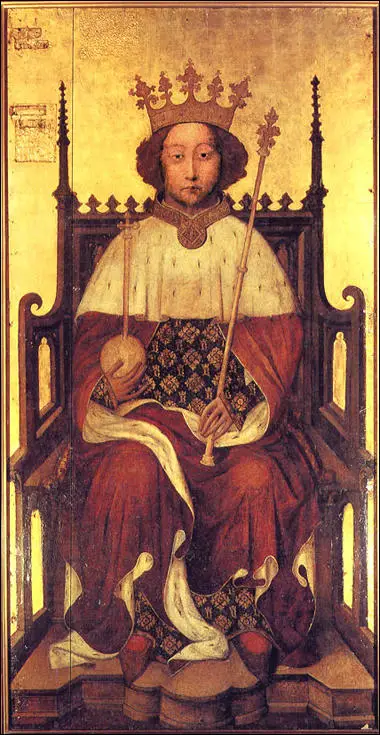
Richard II by unknown artist (c. 1395)
On this day in 1832 The Times newspaper makes an outrageous attack on Elizabeth Sharples. "Elizabeth Sharples is a female who exhibits herself in so unfeminine a manner... So utterly illiterate is the poor creature, that she cannot yet read what is set down for her with any degree of intelligibility... with her ignorance and unconquerable brogue... her lecturing is almost as ludicrous as it is painful to witness."
Billed as "the first Englishwoman to speak publicly on matters of politics and religion" she gave her first talk on 29th January 1832. Sharples pointed out in her speech: "I will set before my sex the example of asserting an equality for them with their present lords and masters, and strive to teach all, yes, all, that the undue submission, which constitutes slavery, is honourable to none; while the mutual submission, which leads to mutual good, is to all alike dignified and honourable." "Cast in the role of the Egyptian goddess Isis, she stood on the stage of the theatre, the floor strewn with whitethorn and laurel, and delivered lectures on mystical religion and women's rights."
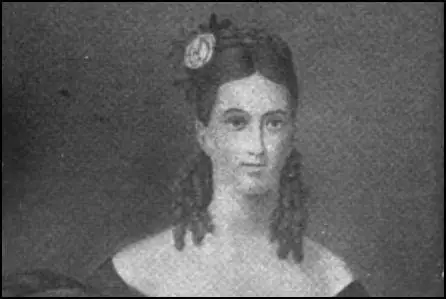
On this day in 1847 Anna Howard Shaw was born in Newcastle-upon-Tyne. Her family emigrated to the United States in 1851 and settled on the Michigan frontier.
Her father left home and after her mother had a mental breakdown, the 12 year old Anna had to take responsibility for the rest of the family. At the age of fifteen Anna became a school teacher.
A convert to woman's suffrage, Anna became America's first Methodist woman minister in 1880. An outstanding open-air preacher, Anna spoke on various issues including prohibition and women's rights.
In 1886 she graduated from Boston University as a doctor, but decided to work instead for the cause of woman's suffrage. Anna was a member of the Women's Christian Temperance Union and was president of the National American Woman Suffrage Association (1904-1915). She published her autobiography, The Story of a Pioneer, in 1915.
Anna Howard Shaw, who was head of the Women's Council of National Defense during the First World War, died on 2nd July, 1919.
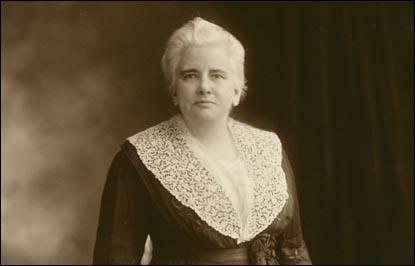
On this day in 1856 Frank Harris, the third son and fourth of the five children of Thomas Vernon Harris (1814–1899), a mariner, and his wife, Anne (1816–1859), was born in Galway. According to his biographer, Richard Davenport-Hines: "He endured a mean, miserable, and loveless childhood, in which he resented alike the puritanical severity of his father and the discipline of his masters at the Royal School in Armagh and, later, Ruabon Grammar School in Denbighshire (1869–71)"
Harris wrote about his time at Ruabon Grammar School in his autobiography, My Life and Loves (1922): "The English are proud of the fact that they hand a good deal of the school discipline to the older boys: they attribute this innovation to Arnold of Rugby and, of course, it is possible, if the supervision is kept up by a genius, that it may work for good and not for evil; but usually it turns the school into a forcing-house of cruelty and immorality. The older boys establish the legend that only sneaks would tell anything to the masters, and they are free to give rein to their basest instincts."
Harris emigrated to the United States in 1871 and went to live with his brother in Lawrence, Kansas. He enrolled at the University of Kansas in 1874 and passed the Douglas County bar examinations in 1875. He then moved to Brighton and became a French tutor at Brighton College. Harris married Florence Ruth (1852–1879) in Paris, on 17th October 1878. On her death of tuberculosis ten months later, he moved to London where he attempted to make a living from journalism. He joined the Social Democratic Federation where he made contact with H. M. Hyndman, Tom Mann, John Burns, Eleanor Marx, George Lansbury, Edward Aveling, H. H. Champion, Guy Aldred, Dora Montefiore, Clara Codd, John Spargo and Ben Tillett.
In 1883 he was appointed editor of The London Evening News. By this time he had left the SDF but the newspaper did run several campaigns against poverty. Harris developed a reputation as being hostile to the aristocracy with his emphasis on society scandals. Michael Holroyd pointed out: "He (Harris) quadrupled its circulation by sending his journalists to the police courts, and startling his readers with alluring headlines, 'Extraordinary Charge Against a Clergyman and Gross Outrage on a Female'. It was Harris who had reported in scabrous detail the divorce case of Lady Colin Campbell, receiving an indictment for obscene libel that assisted the paper's Tory proprietor in dismissing him in 1886." Soon afterwards he became the editor of The Fortnightly Review.
Frank Harris married Emily Clayton on 2nd November 1887. She was the widow of Thomas Greenwood Clayton, a successful businessman. He intended to use her fortune of £90,000 to launch his political career. He joined the Conservative Party and became the prospective candidate in South Hackney. However, he withdrew his candidature in 1891, after supporting Charles Stewart Parnell in the O'Shea divorce. Harris was a well-known womaniser and his wife left him in 1894.
Harris appointed George Bernard Shaw and Max Beerbohm as drama critics for The Fortnightly Review. He also published long articles by Shaw (Socialism and Superior Brains) and Oscar Wilde (The Soul of Man Under Socialism) about socialism. Harris also continued to campaign against the aristocracy and financial corruption. This made him many enemies and in 1894 he was sacked by Frederick Chapman, the owner of the journal, for publishing an article by Charles Malato, an anarchist who praised political murder as "propaganda… by deed".
Harris now purchased The Saturday Review. The author, H.G. Wells, got to know him during this period: "His dominating way in conversation startled, amused and then irritated people. That was what he lived for, talking, writing that was loud talk in ink, and editing. He was a brilliant editor, for a time, and then the impetus gave out, and he flagged rapidly. So soon as he ceased to work vehemently he became unable to work. He could not attend to things without excitement. As his confidence went, he became clumsily loud."
Once again he appointed George Bernard Shaw as his drama critic on a salary of £6 a week. Shaw later commented that was "not bad pay in those days" and added that Harris was "the very man for me, and I the very man for him". Shaw's hostile reviews led to some managements withdrawing their free seats. Some of the book reviewers were so severe that publishers cancelled their advertisements. Harris was forced to sell the journal for financial reasons in 1898. Michael Holroyd has argued: "There had been a number of libel cases and rumours of blackmail - later put down by Shaw to Harris's innocence of English business methods."
Margot Asquith and Herbert Henry Asquith also met him at this time. Margot recalled in her autobiography: "He sat like a prince - with his sphinx-like imperviousness to bores - courteous and concentrated on the languishing conversation. I made a few gallant efforts; and my husband, who is particularly good on these self-conscious occasions, did his best... but to no purpose."
According to his biographer, Richard Davenport-Hines, Harris had a complicated sex life: "In 1898 Harris was maintaining a ménage at St Cloud with an actress named May Congden, with whom he had a daughter, together with a house at Roehampton containing Nellie O'Hara, with whom he possibly also had a daughter (who died young). He seems to have had other daughters with different women. O'Hara was his helpmate and âme damnée for over thirty years. Apparently the natural daughter of Mary Mackay and a drunkard named Patrick O'Hara, she was a clumsy schemer, battening onto Harris in the hope of millions but encouraging him in self-destructive and rascally courses."
Frank Harris became friends with several leading literary figures, including George Meredith, Oscar Wilde and Walter Pater. In his autobiography, My Life and Loves (1922), Harris recalled that: "One day in 1890 I had George Meredith, Walter Pater and Oscar Wilde dining with me in Park Lane and the time of sex-awakening was discussed. Both Pater and Wilde spoke of it as a sign of puberty. Pater thought it began about thirteen or fourteen and Wilde to my amazement set it as late as sixteen. Meredith alone was inclined to put it earlier."
In 1900 Frank Harris had a book of short stories, Montes the Matador, published. Later that year, his first play, Mr and Mrs Daventry, was produced. The play, that dealt with adultery and sexually emancipated women, was described by Gerald du Maurier, as "the most daring and naturalistic production of the modern English stage… at once repellent and fantastic". His novel, The Bomb, about anarchism set in Chicago, appeared in 1908. The reviewer in the Times Literary Supplement called it a "highly charged with an explosive blend of socialistic and anarchistic matter, wrapped in a gruesome coating of exciting fiction… crowded with swindled workmen, callous employers, brutal police, inhuman millionaires". This was followed by three works about William Shakespeare, entitled The Man Shakespeare (1909), Shakespeare and his Love (1910) and The Women of Shakespeare (1911).
In August 1913, Harris began a magazine entitled, Modern Society. He employed Enid Bagnold as a staff writer. She later recalled: "He was an extraordinary man. He had an appetite for great things and could transmit the sense of them. He was more like a great actor than a man of heart. He could simulate anything. While he felt admiration he could act it, and while he acted it, he felt it. And greatness being his big part, he hunted the centuries for it, spotting it in literature, in passion, in action." She added: "His theory was that women love ugly men. He made sin seem glorious. He was surrounded by rascals. It was better than meeting good men. The wicked have such glamour for the young."
In her Autobiography (1917) she admitted that Harris took her virginity. "The great and terrible step was taken... I went through the gateway in an upper room in the Cafe Royal. That afternoon at the end of the session I walked back to Uncle Lexy's at Warrington Crescent, reflecting on my rise. Like a corporal made sergeant.... And what about love - what about the heart? It wasn't involved. I went through this adventure like a boy, in a merry sort of way, without troubling much. I didn't know him. If I had really known him I might have been tender." During dinner with Uncle Lexy she later wrote that she couldn't believe that her skull wasn't chanting aloud: "I'm not a virgin! I'm not a virgin".
In February 1914 Harris was sent to Brixton Prison for contempt of court following an article on Earl Fitzwilliam, who had been cited as a co-respondent in a divorce case. On his release he moved to New York City. In 1915 he published Contemporary Portraits. The following year he published a biography of Oscar Wilde. Harris also wrote extensively about the First World War. He was highly critical of the way the war was being fought and some of these were described as "traitorious". He also predicted that Germany would win the war. These articles appeared as England or Germany? (1915). In 1916 he became editor of Pearson's Magazine. According to his biographer, Richard Davenport-Hines: "He (Harris) repeatedly clashed with American censorship and made many enemies with his rude, unpredictable, and arrogant conduct."
Harris now moved to Nice. After the death of his second wife he married Nellie O'Hara. Harris's response to becoming sexually impotent was to write an autobiography about his sex life. Harris told George Bernard Shaw: "I am going to see if a man can tell the truth naked and unashamed about himself and his amorous adventures in the world." The first volume of My Life and Loves was published in 1922. The first volume was burnt by customs officials and the second volume resulted in him being charged with corrupting public morals.
In 1928 Harris wrote to Shaw asking if he could write his biography. Shaw replied: "Abstain from such a desperate enterprise... I will not have you write my life on any terms." Harris was convinced that the royalties of the proposed book would solve his financial problems. In 1929 he wrote: "You are honoured and famous and rich - I lie here crippled and condemned and poor."
Eventually, George Bernard Shaw agreed to cooperate with Harris in order to help him provide for his wife. Shaw told a friend that he had to agree because "Frank and Nellie... were in rather desperate circumstances." Shaw warned Harris: "The truth is I have a horror of biographers... If there is one expression in this book of yours that cannot be read at a confirmation class, you are lost for ever. " He sent Harris contradictory accounts of his life. He told Harris that he was "a born philanderer". On another occasion he attempted to explain why he had little experience of sexual relationships. In 1930 he wrote to Harris: "If you have any doubts as to my normal virility, dismiss them from your mind. I was not impotent; I was not sterile; I was not homosexual; and I was extremely susceptible, though not promiscuously."
Frank Harris died of heart failure on 26th August 1931. Shaw sent Nellie a cheque and she arranged to send him the galley-proofs. The book was then rewritten by Shaw: "I have had to fill in the prosaic facts in Frank's best style, and fit them to his comments as best I could; for I have most scrupulously preserved all his sallies at my expense.... You may, however, depend on it that the book is not any the worse for my doctoring." George Bernard Shaw was published in 1932.
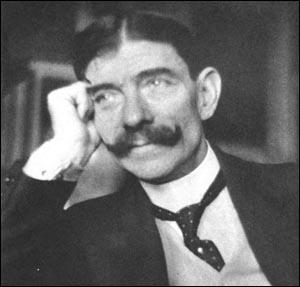
On this day in 1890 Beatrice Potter recorded in her diary her first meeting with Sidney Webb. "Sidney Webb, the socialist, dined here to meet Charles and Mary Booth. A remarkable little man with a huge head on a very tiny body, a breadth of forehead quite sufficient to account for the encyclopaedic character of his knowledge, a Jewish nose, prominent eyes and mouth, black hair, somewhat unkept, spectacles and a most bourgeois black coat shiny with wear. With his thumbs fixed pugnaciously in a far from immaculate waistcoat, with his bulky head thrown back and his little body forward he struts even when he stands, delivering himself with extraordinary rapidity of thought and utterance and with an expression of inexhaustible self-complacency. But I like the man. There is a directness of speech, an open-mindedness, an imaginative warm-heartedness which should carry him far. He has the self-complacency of one who is always thinking faster than his neighbours, who is untroubled by doubts, and to whom the acquisition of facts is as easy as the grasping of matter; but he has no vanity and is totally unself-conscious."
Beatrice wrote in her diary: "his tiny tadpole body, unhealthy skin, cockney pronunciation, poverty, are all against him". They eventually became close friends and in 1892 she agreed to marry him. She wrote in her diary that "it is only the head that I am marrying." Beatrice had an income of £1,000 that she had inherited from her rich father. This money enabled Sidney to give up his post as a Civil Servant and he now concentrated on his political work.
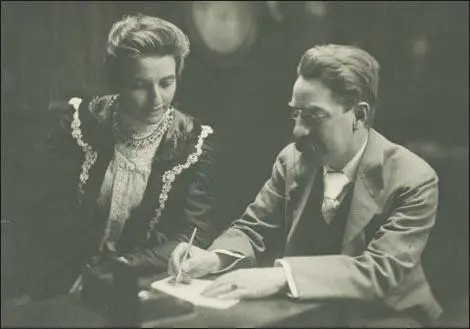
On this day in 1904 Winston Churchill votes against the Conservative Party in the House of Commons. Churchill became convinced that the Liberal Party would win Oldham at the next general election because of the town's views on free trade. Churchill had several meetings with senior Liberal figures such as David Lloyd George and Herbert Gladstone about the possibility of switching parties. It was agreed that on 14th February 1904 he would vote with the Liberals on a Free Trade motion in the House of Commons. However, it was not until the 29th March that he told Parliament that he intended joining the Liberals. In protest, all the Conservative Party MPs walked out of the chamber.
Randolph S. Churchill, the author of Winston Churchill (1967) pointed out: "He (Churchill) entered the Chamber of the House of Commons, stood for a moment at the Bar, looked briefly at both the Government and Opposition benches and strode swiftly up the aisle. He bowed to the Speaker and turned sharply to his right to the Liberal benches. He sat down next to Lloyd George in a seat that his father had occupied when in opposition - indeed, the same seat on which Lord Randolph had stood waving his handkerchief to cheer the downfall of Gladstone in 1885."
Churchill argued that David Lloyd George was a major influence on his early political life: "Naturally such a man greatly influenced me. When I crossed the floor of the House and left the Conservative Party in 1904, it was by his side I took my seat." It has been argued that Lloyd George became a father figure to Churchill. John Grigg, Lloyd George's biographer, has claimed that "Churchill soon fell under Lloyd George's spell and for the rest of his life never ceased to regard the Welshman as his master."
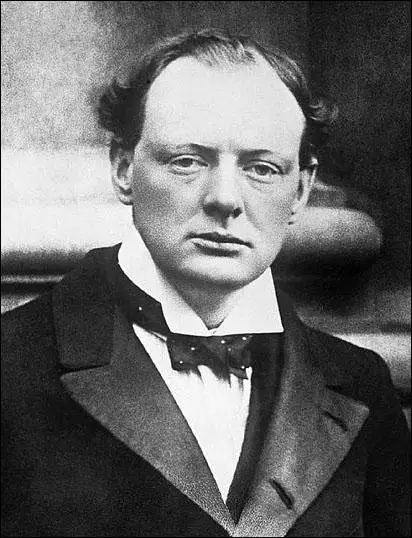
On this day in 1913 Jimmy Hoffa, the son of a coal driller, was born. His father died when he was seven and in 1924, the family moved to Detroit.
Jimmy Hoffa left school at fourteen and worked as a department-store stock boy. An active trade unionist, in 1932, he led a strike at a Detroit grocery store. By the age of 37 he was chairman of the Central States Drivers Council in 1940 and two years was elected president of the Michigan Conference of Teamsters.
In 1952 Jimmy Hoffa became vice president of the Teamsters Union under Dave Beck, the president. Allegations were made in 1956 that the leadership of the union was involved in illegal activities. The Select Committee on Labor, that included Joe McCarthy, Barry Goldwater, Karl Mundt and John F. Kennedy, decided that these charges needed to be investigated.
Robert Kennedy, chief counsel of the committee, was instructed to collect information and discovered several financial irregularities. This included taking $85,119 between 1949 and 1953 from union funds to pay his own personal bill. The investigation also revealled that a Seattle builder had received $196,516 out of union funds to pay for work done on Beck's home. The investigations were televised and Kennedy's questioning turned him into a national political figure.
Beck was eventually imprisoned for five years and Jimmy Hoffa became the new president of the Teamsters Union. Robert Kennedy now began investigating Hoffa and he was eventually charged with corruption. Kennedy claimed that Hoffa had misappropriated $9.5 million in union funds and had corruptly done deals with employers. Hoffa's lawyer, Edward Bennett Williams, managed to persuade the jury to find him not guilty. George Meany, president of the AFL-CIO, did not agree with the verdict and Hoffa and the Teamsters Union were expelled from the association.
Jimmy Hoffa was popular with his members and in 1960 was re-elected as president of the Teamsters Union. A long-term supporter of the Republican Party, Hoffa was a generous supplier of funds to Richard Nixon in his presidential struggle with John F. Kennedy. During the campaign, Robert Kennedy sent Hoffa a copy of his book, The Enemy Within. Kennedy wrote inside: "To Jimmy. I'm sending you this book so you won't have to use union funds to buy one. Bobby."
After Kennedy's election victory in 1960 he appointed Robert Kennedy as his attorney general. Once in office, Kennedy resumed his investigations into Hoffa's activities. Hoffa was eventually charged with taking money from the union's $300 Pension Fund. J. Edgar Hoover, a long-term opponent of the Kennedys, passed FBI files on the attorney general to Roy Cohn, who in turn gave them to Hoffa. However, Hoffa, who disapproved of the Kennedy's adulterous behaviour, declined to use this material against his prosecutors.
A former official of the union, E. G. Partin, was in prison facing charges of kidnapping, murder, robbery and rape, agreed to do a deal with the authorities and provide evidence against Hoffa. At the first trial at Nashville in October, 1962, the hung jury voted 7-5 for acquittal. The judge, believing that Hoffa's team were guilty of jury tampering, called a mistrial. At the second trial at Chattanooga in January, 1964, Hoffa was found guilty and sentenced to eight years in prison.
In December, 1971, President Richard Nixon ordered Hoffa's release. Later, FBI records revealed that Nixon had received illegal campaign donations from the Teamsters Union in exchange for a presidential pardon. After his release Hoffa travelled the country campaigning for prison reform. He also attempted to return as leader of the Teamsters Union. On 30th July, 1975, Jimmy Hoffa disappeared when travelling to a meeting with the Detroit gangster, Anthony Giacalone. In 1982 Hoffa was legally declared "presumed dead".
In 1989 Kenneth Walton, the head of the FBI's Detroit office, told The Detroit News he knew what happened to Hoffa. “I’m comfortable I know who did it, but it’s never going to be prosecuted because… we would have to divulge informants, confidential sources.”
On 14th January, 1992, the New York Post claimed that Hoffa, Santos Trafficante and Carlos Marcello had all been involved in the assassination of President John F. Kennedy. Frank Ragano was quoted as saying that at the beginning of 1963 Hoffa had told him to take a message to Trafficante and Marcello concerning a plan to kill Kennedy. When the meeting took place at the Royal Orleans Hotel, Ragano told the men: "You won't believe what Hoffa wants me to tell you. Jimmy wants you to kill the president." He reported that both men gave the impression that they intended to carry out this order.
In his autobiography, Mob Lawyer (1994) (co-written with journalist Selwyn Raab) Frank Ragano added that in July, 1963, he was once again sent to New Orleans by Hoffa to meet Santos Trafficante and Carlos Marcello concerning plans to kill President John F. Kennedy. When Kennedy was killed Hoffa apparently said to Ragano: "I told you could do it. I'll never forget what Carlos and Santos did for me." He added: "This means Bobby is out as Attorney General". Marcello later told Ragano: "When you see Jimmy (Hoffa), you tell him he owes me and he owes me big."
It is possible that Jimmy Hoffa was killed in 1975 to stop him from testifying in front of the House Select Committee on Assassinations. Fellow Mafia suspect in the Kennedy assassination, Sam Giancana, was also murdered at the same time Hoffa disappeared.
In 1989 Kenneth Walton, the head of the FBI's Detroit office, told The Detroit News he knew what happened to Hoffa. “I’m comfortable I know who did it, but it’s never going to be prosecuted because… we would have to divulge informants, confidential sources.”
Just before he died, Frank Sheeran, confessed to author Charles Brandt that he killed Jimmy Hoffa. According to Sheeran, Chuckie O'Brien drove Hoffa, Sheeran and another mobster Sal Briguglio to a house in Detroit. Hoffa and Sheeran went into the house and the other two men drove off. Sheeran says he shot Hoffa twice behind the right ear. After the murder, Sheeran says he left the house and was told Hoffa was cremated. The full story appears in Brandt's book I Heard You Paint Houses (2003).
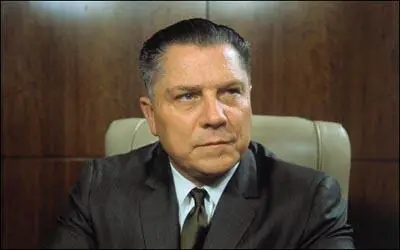
On this day in 1929 St Valentine's Day Massacre took place. Dion O'Banion was the owner of a florist shop in Chicago. After the passing of the National Prohibition Act he was also one of the main providers of illegal alcohol in Chicago. In 1926 O'Banion was shot dead outside his shop. His gang were convinced that the murder had been ordered by Al Capone, a rival bootlegger. Soon after O'Banion's death eight cars filled with gangsters, raked Capone's headquarters with machine-gun fire. This heralded the start of Chicago's gar wars. Over the next few years over 500 gangsters were killed in the city. The most notorious case was an event that became known as the St. Valentine's Day Massacre.
At half-past ten on 14th February, 1929, six members of the Bugs Moran gang were sitting in a garage waiting for a consignment of illegal alcohol. Instead a Cadillac arrived carrying three men dressed as policemen. They were accompanied by two men in civilian clothes. The policemen entered the building and told the six gangsters and John May, a mechanic working in the garage, to stand in a row against the wall with their hands in the air. This was common procedure during a police raid and the men did as they were told. Two civilians then entered the garage and mowed them down with sub-machine gun fire.
Walter Trohan was the first reporter to arrive at the garage: "I was the first man on the scene of carnage, being careful to avoid the hinging of the crazed police dog chained to one of the garage trucks. The most memorable remark of the day was that of O'Rourke of the Chicago Evening American who looked down at his feet after tracking around the garage and said: 'I've got more brains on my feet than I have in my head.' Other staffers joined me in tracing the path of ambush and the story of the slaying of six members of the George (Bugs) Moran mob, rivals of the Al Capone gang."
John Miller of the Chicago American arrived soon afterwards: "Sprawled grotesquely at the base of the bullet-riddled stone wall were six distorted bodies; a seventh lay slumped over a wooden chair. One of the officers called out, 'This one's Pete Gusenberg, an ex-con and the chief gunner for the Drucci-Moran gang. Here's Al Weinshank, the North Side booze runner, and Artie Davis from the West Side mob. And this was James Clark, Bugs Moran's brother-in-law. Here what's left of Doc Schwimmer.' The other mobster was Frank Gusenberg, the only one still alive. He died within half an hour without giving the police any information. Although it was assumed that the murders had been ordered by Al Capone, no one was ever convicted of the crime.
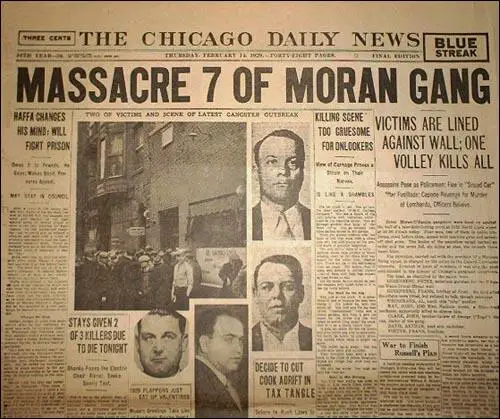
On this day in 1937, William Ball was killed during the battle at Jarama. William Ball was born in Reading in 1915. His father, Henry Ball, ran a chemist shop in Oxford Road. Ball went to Reading School where they became friends with John Boulting and Josh Francis. According to the authors of We Cannot Park on Both Sides (2000): "Bill Ball, John Boulting and Josh Francis had been members of the Officer Training Corps (OFC) at Reading School, which provided boys with basic military training and familiarity with weapons. Ball, a Corporal in the OTC was also a member of the School's rifle shooting team."
Ball, who lived with his parents in Clifton Park Road, Caversham, was a member of the Reading Branch of the Young Communist League, that included Thora Silverthorne and Reginald Saxton. He was also close to Josh Francis, John Boulting, Roy Poole and Rosamund Powell, who were all members of the Labour Party League of Youth. Ball was also an active member of the Friends of the Soviet Union.
On the outbreak of the Spanish Civil War Ball became very involved in the campaign to support the Popular Front government against the Nationalists led by General Francisco Franco. He eventually decided to join the International Brigades. According to his friend Jimmy Moon, Ball's father "was a left-winger, but he was furious" with his son's decision as he thought it would "ruin your career". However, later he boasted: "I've got a boy in Spain".
Ball left for Spain at the beginning of January 1937 with Cyril Sexton. "The first days of January 1937 saw a group on their way from Victoria Station, a small part of this group were Ball, Bibby, Johnson (with ski boots), Hart and myself. We kept more or less together to Paris. That night in the hotel we were allocated a room with two double beds, Ball and Bibby shared one, and Hart and myself the other. In those days I was completely non-political and that night Ball taught me the tune and words of the international. We shared a taxi to the Gare Austerlitz, where we met up with the others, and then shared a railway carriage to Perpignan, then the coach to Figueras. Our group stayed together even to the billets in the old cinema in Madrigueras."
Whereas his friends, John Boulting, Roy Poole, Rosamund Powell, Thora Silverthorne and Reginald Saxton joined the British Medical Aid Unit, Ball, like Josh Francis, joined the British Battalion and became a member of the machine-gun in No.2 Company, where he served under Harry Fry.
Ball's first military action took place at Jarama on 12th February 1937. One of his comrades, Cyril Sexton, later recalled what happened: "The 12th of February 1937 found us struggling up the side of a hill whilst the riflemen of l, 3 and 4 Companies went ahead. Eventually our No.2 Company were in a position in advance to the "sunken road" overlooking the conical and rounded hill, and further on the Jarama Valley. Our Maxim, the crew of which still had Ball, Bibby, Hart and myself, were ordered to dig and mount our Maxim on the left flank behind the "sunken road". This gave us a good field of fire to the left flank, down the "sunken road" and also to the hills where 1, 3 and 4 Companies were fighting."
Ball worked very closely with Jock Cunningham, the commander of the British Battalion, during the battle at Jarama. On 14th February 1937 Ball was killed. His death was described by fellow soldier, Tommy James: "Tank shells began to fall all around us. At this moment Jock Cunningham... came up accompanied by Comrade Ball... They paused whilst jock scanned the Fascist positions through his field glasses. Suddenly, a shell burst right beside them... The explosion tore the leg off Comrade Ball... for a few minutes Ball lay, blood pouring from his ghastly wound and reddening the soil, but he died as he was carried away. I will never forget the look of rage and hatred upon Jock's face as he kicked loose soil over the blood soaked soil. Ball was his greatest friend."
Thora Silverthorne wrote to her family on 9th March, 1937: "Did you know that Comrade Ball of Reading (son of the chemist Dad was friendly with) was killed on this front! He'd behaved very well: the commandant praised him highly. Said he was due for promotion for his splendid behaviour. Please give my very sincere sympathy to Comrade Ball's father; tell him his son died with many other fine fellows but not in vain."
In the 1938 May Day pageant held in Reading large photographs of William Ball and Josh Francis were carried under the slogan "Reading's heroes in Spain."
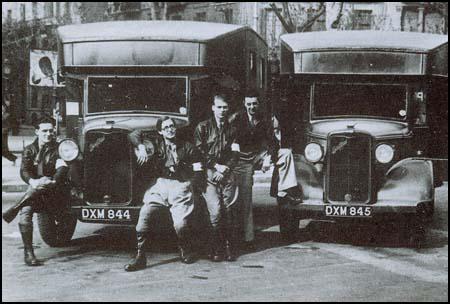
On this day in 1944 Carl Bernstein was born in Washington. Both his parents, Al and Sylvia Bernstein, were active trade unionists and members of the American Communist Party. As a result of the Red Scare they were both blacklisted and after the execution of Julius Rosenberg and Ethel Rosenberg, the family went into hiding as they feared this was the beginning of a wave of persecution of Jews.
Bernstein became a journalist and in 1966 began working for the Washington Post. However, his articles did not find favour with his editor, Ben Bradlee. According to Deborah Davis, the author of Katharine the Great (1979): Carl Bernstein was the "house misfit, who was talented enough to be a new journalist and wrote in the dramatic prose that Bradlee enjoyed, but whose insistent pieces on ethnic neighborhoods, alternative politics (the missing link between the war and the counterculture), the movement as a movement, not a fashion, were a continual source of annoyance to him. Bernstein was not part of Bradlee's scheme; he killed a good number of his stories, and he cursed the guild for standing in the way of firing him."
On 3rd July, 1972, Frank Sturgis, Virgilio Gonzalez, Eugenio Martinez, Bernard L. Barker and James W. McCord were arrested while removing electronic devices from the Democratic Party campaign offices in an apartment block called Watergate. It appeared that the men had been to wiretap the conversations of Larry O'Brien, chairman of the Democratic National Committee.
The phone number of E.Howard Hunt was found in address books of the burglars. Reporters were now able to link the break-in to the White House. Bernstein and fellow journalist, Bob Woodward, began working on the case. Woodward had a government source who was given the name "Deep Throat". He informed Woodward that senior aides of President Richard Nixon, had paid the burglars to obtain information about its political opponents.
Bernstein and Woodward discovered that in 1972 Frederick LaRue worked with John Mitchell on Nixon's re-election committee. On 20th March, LaRue attended a meeting of the committee where it was agreed to spend $250,000 "intelligence gathering" operation against the Democratic Party. This included the decision to plant electronic devices from the Democratic campaign offices in Watergate.
Frederick LaRue now decided that it would be necessary to pay the large sums of money to secure the the silence of the burglars. LaRue raised $300,000 in hush money. Tony Ulasewicz, a former New York policeman, was given the task of arranging the payments.
In January, 1973, Frank Sturgis, E.Howard Hunt, Virgilio Gonzalez, Eugenio Martinez, Bernard L. Barker, Gordon Liddy and James W. McCord were convicted of conspiracy, burglary and wiretapping.
Nixon continued to insist that he knew nothing about the case or the payment of "hush-money" to the burglars. However, in April 1973, Nixon forced two of his principal advisers H. R. Haldeman and John Ehrlichman, to resign. A third adviser, John Dean, refused to go and was sacked.
On 20th April, Dean issued a statement making it clear that he was unwilling to be a "scapegoat in the Watergate case". When Dean testified on 25th June, 1973 before the Senate Committee investigating Watergate, he claimed that Richard Nixon participated in the cover-up. He also confirmed that Nixon had tape-recordings of meetings where these issues were discussed.
The Special Prosecutor now demanded access to these tape-recordings. At first Nixon refused but when the Supreme Court ruled against him and members of the Senate began calling for him to be impeached, he changed his mind. However, some tapes were missing while others contained important gaps.
Under extreme pressure, Nixon supplied tapescripts of the missing tapes. It was now clear that Nixon had been involved in the cover-up and members of the Senate began to call for his impeachment. On 9th August, 1974, Richard Nixon became the first President of the United States to resign from office. Nixon was granted a pardon but other members of his staff involved in helping in his deception were imprisoned.
Bernstein, Bob Woodward, Ben Bradlee and the Washington Post received a great deal of credit for exposing the Watergate Scandal and in 1973 the newspaper was awarded the Pulitzer Prize for journalism. Bernstein and Woodward also wrote two books about Watergate: All the President's Men (1975) and The Final Days (1976).
Bernstein left the Washington Post in 1976 to work as a Washington Bureau Chief and eventually as senior correspondent for ABC-TV. While at ABC, he uncovered a secret agreement between the United States, Egypt, China and Pakistan to supply arms to the Mujahadeen rebels in Afghanistan against the Soviets.
In 1977 Bernstein wrote an article about Operation Mockingbird, a CIA covert operation to control the mass media. He also contributed articles to several major publications including Time Magazine, The New Republic, New York Times, Newsweek and the Rolling Stone Magazine.
Books by Bernstein include Loyalties: A Son's Memoir (1989) an account of his parents' encounter with McCarthyism and His Holiness - John Paul II and the Hidden History of Our Time (1998).
Carl Bernstein is contributing editor for Vanity Fair magazine and in 2007 published A Woman in Charge, a biography of Hillary Rodham Clinton.
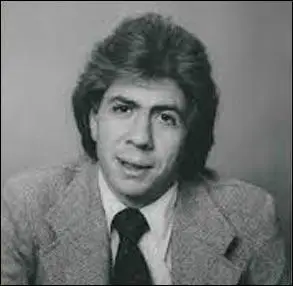
On this day in 1970 Gilbert Mitchison a founding member of the Socialist League died. Mitchison was born in Staines on 23rd March 1890. Educated at Eton and New College, Oxford. He qualified as a lawyer but on the outbreak of the First World War joined the British Army. While on leave in 1916 Mitchison married the VAD nurse, Naomi Mitchison.
Mitchison served with the Queen Bays on the Western Front and promoted to the rank of major became a member of the British Mission to French Forces in Italy. Mitchison suffered a fractured skull in a road accident at Gamache. When he left hospital he joined the Staff College. After finishing his training in the summer of 1917 he obtained a staff post in France.
A member of the Labour Party Mitchison unsuccessfully contested the Kings Norton division of Birmingham. In 1931 G.D.H. Cole created the Society for Socialist Inquiry and Propaganda (SSIP). This was later renamed the Socialist League. Members included Mitchison, William Mellor, Charles Trevelyan, Stafford Cripps, H. N. Brailsford, D. N. Pritt, R. H. Tawney, Frank Wise, David Kirkwood, Clement Attlee, Neil Maclean, Frederick Pethick-Lawrence, Alfred Salter, Jennie Lee, Gilbert Mitchison, Harold Laski, Frank Horrabin, Ellen Wilkinson, Aneurin Bevan, Ernest Bevin, Arthur Pugh, Michael Foot and Barbara Betts.
According to Ben Pimlott, the author of Labour and the Left (1977): "The Socialist League... set up branches, undertook to promote and carry out research, propaganda and discussion, issue pamphlets, reports and books, and organise conferences, meetings, lectures and schools. To this extent it was strongly in the Fabian tradition, and it worked in close conjunction with Cole's other group, the New Fabian Research Bureau." The main objective was to persuade a future Labour government to implement socialist policies.
Mitchison was successfully elected to represent Kettering in 1945. Mitchison was opposition spokesman on Housing and Local Government (1955-59), Treasury and Trade Affairs (1959-61), Science (1961-63), Works (1962-63), Treasury Affairs (1962-63) and Pensions (1963-64). On the election of the Labour Government in 1964, Harold Wilson appointed Mitchison as parliamentary secretary to Ministry of Land and Natural Resources.
In August 1964 he was created Baron Mitchison and joined the House of Lords. He also became a member of the Harlow Development Corporation (1966-70). Gilbert Mitchison died on 14th February, 1970.
